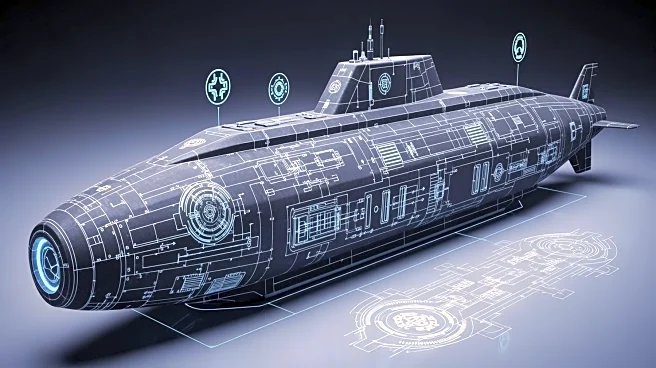What's Happening?
Anduril Industries, an American defense company, has inaugurated a new production facility in Sydney dedicated to manufacturing the 'Ghost Shark' unmanned submarine for the Royal Australian Navy. The Ghost Shark is based on Anduril's Dive-XL platform,
an all-electric autonomous underwater vehicle (AUV) designed for flexibility and scalability. The Royal Australian Navy awarded Anduril a $1.1 billion contract in September to produce these submarines at scale. The first low-rate production hull was unveiled at the factory's launch ceremony, attended by Australia's defense minister and the head of the Royal Australian Navy. The Ghost Shark is engineered to provide a cost-effective, stealthy, and long-range undersea capability, capable of intelligence, surveillance, reconnaissance, and strike missions.
Why It's Important?
The opening of this factory marks a significant step in enhancing Australia's maritime defense capabilities. The Ghost Shark's modular design and advanced production techniques allow for rapid adaptation to operational needs, providing a strategic advantage in underwater warfare. This development is crucial for Australia as it seeks to bolster its defense posture in the Indo-Pacific region, where maritime security is increasingly vital. The collaboration with Anduril also underscores the growing defense ties between the United States and Australia, potentially influencing regional security dynamics and defense industry partnerships.
What's Next?
The production of Ghost Sharks is expected to ramp up, with Anduril poised to deliver these submarines in large numbers. This could lead to further contracts and collaborations between the U.S. and Australian defense sectors. The Royal Australian Navy will likely integrate these submarines into its fleet, enhancing its operational capabilities. Additionally, the success of this project may encourage other nations to consider similar unmanned systems, potentially expanding Anduril's market reach.
Beyond the Headlines
The development of unmanned submarines like the Ghost Shark reflects a broader trend towards autonomous military technologies. This shift raises questions about the future of naval warfare and the ethical implications of deploying unmanned systems in combat. As these technologies evolve, they may redefine traditional concepts of deterrence and warfare, prompting discussions on international regulations and norms.















